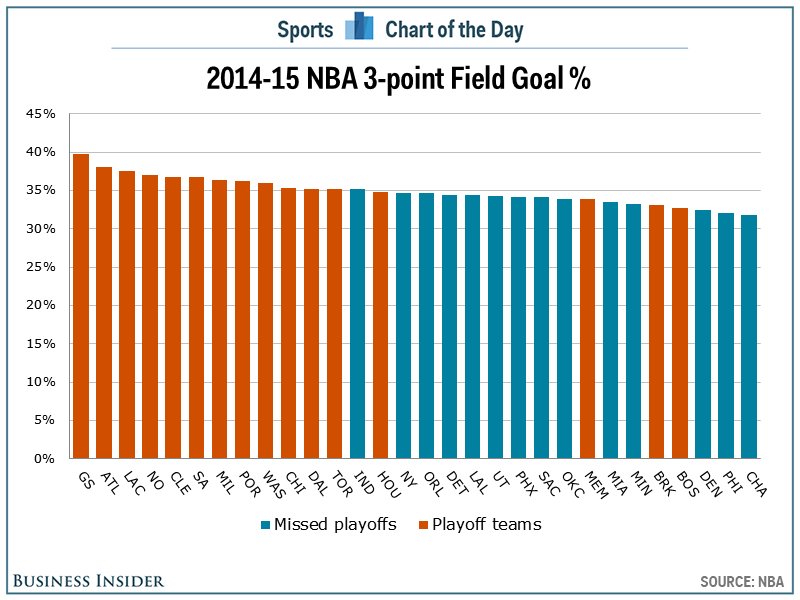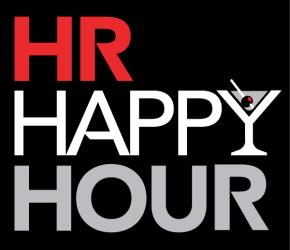Of course you are following th human drama that is the NBA playoffs as closely as I am. That is a given. The playoffs are where the best teams rise to the top, the stars (and future stars) get their opportunity to shine, and is the case with many sports, more casual fans tune in to watch, as the games are now more important.
If you are one of those casual NBA fans you might not be aware of one of the aspects of how NBA basketball has changed in recent years - namely the increasing volume and importance of 3-point shooting in the modern NBA game. In the past, most teams were designed (and attacked) from the 'inside-out', i.e. with dominant big men like Kareem, Hakeem, and Shaq dominating the play as their teams tried to feed them the ball close to the basket in order to take easy shots.
But in the modern NBA most of the better teams have taken a different approach to offensive basketball, one that still values close to the basket attempts as in the past, but increasingly relies upon and values taking and making the 3 point shot. Take a look at the chart below that shows how each NBA team stacked up this year with 3 point shot efficiency, then some (not all sports-related) comments from me after the data:

One thing more hard-core NBA fans will notice is that the most proficient 3-point shooting teams, (Golden State and Atlanta), were also the teams with the best records in the league this season. And all of the top 10 or so 3-point shooting teams qualified for the playoffs, with several of them being considered real contenders for the title. Conversely, most of the teams on the far right of the chart, (the worst 3-point shooting teams), were in the conversation all year for 'worst teams in the league'.
So enough basketball, let's talk why this might matter more broadly and in non-NBA contexts. There are at least three lessons from how the modern NBA has (almost) completely changed its collective attitude towards the 3-point shot that are relevant for normal folks with responsibility to make their organizations better.
1. There remains, despite easily and broadly available evidence of how increased proficiency at the 3-point shot leads to better team success, a still fairly significant set of team executives, coaches, and even pundits, who bemoan the growing importance of the long-range shot and long for the days of the 70s and 80s where more 'traditional' basketball was played. Teams that continue to leave these kinds of thinkers in positions of leadership and influence, (Lakers, Knicks), are simply going to continue to struggle to compete with more progressive and adaptive teams.
Lesson - leaders who don't or can't adapt will take down the entire organization with them.
2. The adoption of the 3-point shot as a primary strategic choice by the more successful teams is largely and compellingly backed by data. On the obvious level, it does not take a math wizard to know that a made 3-point shot is 50% more valuable than a traditional 2-point basket. And it is easy to calculate that making only 33% of 3-point shots produces the same number of total points as making 50% of traditional 2-point shots (with 50% being the normal barometer for 'good shooting'). But despite the data being that simple to digest and understand, as we saw in point one above, lots of folks remained unconvinced for way too long.
Lesson - 'Proving' your thesis with data to folks that are likely to be skeptical needs to be distilled into terms and concepts they will understand. In the NBA example talk about Winning, not 'True shooting percentage'. In your example, talk about sales, profits, market share, concepts your leaders will naturally embrace.
3. Basketball has been played for 100+ years. The NBA has been around since the 40s and the 3-point shot was introduced to the NBA game in the 70s. But it has taken about 40 years for the leading thinkers in the game to more fully embrace the shot as the strategic weapon it has become in the modern game. The simple math I alluded to above has not changed in all that time. Why did it take so long to take hold? Hard to say.
Lesson - Even the most mature industries and companies can still innovate and be disruptive (and disruptive). Even a simple idea like 'What is the best way to play basketball?' is subject to improvement re-imagining. It is never too late. Until it is too late that is.
Do not fail to heed the lessons of the 3-point shot....
I am on record as saying you can learn everything you need to know about work, the workplace, people, and business from careful study of the NBA. I remain correct in this belief.
Happy Thursday.


 Steve
Steve



